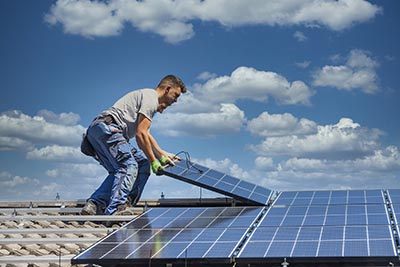
Renewable energies are increasingly becoming popular as there are more demands for energy due to the rising population across the globe. According to a projection by S&P Global Market Intelligence, 44 GW of solar will come online in 2022, which is almost double of 2021’s 23 GW – such is the rise of renewable energy sources.
The increasing dependency on green energy resources is not only to curb pollution and global warming but also to address a lot of other major issues. Let’s take a look at why renewable energy resources are so crucial in today’s date.
1. Controlling global warming
The ever-increasing population is cramming the world, and consequently, there is a steep rise in human activity. As a result, our atmosphere is being overburdened with carbon dioxide (CO2) and other greenhouse gases. The consequences are many, from drought, extinction of species and pollution to rising sea levels and more frequent and stronger storms.
Different non-renewable energy sources generate different amounts of greenhouse gases and air pollutants, leading to global warming. On the contrary, most renewable energy sources yield little to no of these gases and pollutants. Even when the entire life cycle (manufacturing, installation, operation and decommissioning) of clean energy sources are considered, the total global warming emissions are minimal.
➢ Comparison
Evaluating the numbers gives a clearer picture. Coal releases 1.4-3.6 pounds of carbon dioxide equivalent per kilowatt-hour (CO2E/kWh), whereas wind generates only 0.02 to 0.04 pounds of CO2E/kWh based on a life cycle. For solar, it is 0.07 to 0.2, and geothermal is responsible for 0.1 to 0.2. Hydroelectric generates only 0.1 to 0.5.
2. Enhanced public health
The air and water pollution caused by coal and natural gas factories lead to a range of health issues in humans. From breathing problems, heart attacks and neurological damage to cancer and even premature death – pollution has adverse effects on every part of our bodies.
Most of these health impacts are caused by air and water pollution that clean energy resources do not lead to. Wind, hydroelectricity and solar technologies produce electricity without causing any air pollution. Biomass and geothermal systems emit a few air pollutants, but their total air emissions are way lower than those of natural gas and coal-based plants.
➢ Comparison
Moreover, solar and wind energy resources require no water to operate, so they neither pollute water resources nor strain supplies by interfering with drinking water, agriculture and other crucial water requirements. On the other hand, natural gas drilling and coal mining severely pollute drinking water sources. The thermal power plants also consume lots of water for cooling purposes.
3. Economic advantages and job opportunities
Fossil fuel technologies are typically mechanised and capital intensive, while renewable energy resources are more labour intensive. For instance, solar panels require manual labour for installation and wind farms require technicians for repair and maintenance. So, it means that, on average, the renewable energy industry creates more job opportunities than non-renewable systems for each unit of electricity produced.
➢ Industry-wise jobs
The wind energy industry requires employees for various responsibilities such as manufacturing, construction, project development, turbine installation, transportation and logistics, operations and maintenance, and legal, financial and consulting services.
The solar industry employs individuals for manufacturing, solar installation, sales and maintenance. Similarly, other industries, including geothermal, hydroelectricity and biomass, also hire candidates for several operations.
➢ Economic benefits
Apart from the jobs created in the renewable energy industry, the growth in clean energy also can generate positive economic “ripple” effects. For instance, the companies in the clean energy supply chain will gain profit, and unrelated local businesses will gain profit from enhanced household and business incomes.
Local governments also benefit from renewable energy, particularly in the form of property, income taxes and other payments from the renewable energy project owners.
Owners of lands on which wind projects are constructed often receive lease payments and even payments for power line easements. They may also get royalties on the basis of the project’s annual revenues. Rural landowners and farmers can also get new supplemental income sources by supplying feedstocks to the biomass power facilities.
4. Inexhaustible energy
Never-ending sunlight, strong winds, surplus plant matter, abundant heat from the earth’s core and fast-flowing water are things that are inexhaustible. So each of them makes for an extensive and constantly-replenished source of energy. In contrast, conventional energy sources such as coal, oil, and natural gas are finite and cannot be renewed once they exhaust.
Renewable energy has the capability to become a significant source of electricity in the future. Clean energy sources are a crucial element in the sustainable energy system that can propel development in the current times without risking the lives of future generations.
5. Stable energy costs
Clean energy sources are capable of providing affordable electricity and thus can help in stabilising the energy costs in the future. Although setting up renewable facilities need upfront capital investments, once built, they can operate at very low costs. It is majorly because, for most renewable energy technologies, the fuel price is zero. As a result, clean energy costs can be very stable and cheap over time.
Also, the costs of clean energy technologies have come down steadily and are estimated to drop even more in the years to come. Costs will hopefully decline as markets will mature, and there will be more companies taking advantage of economies of scale. On the contrary, fossil fuel prices can abruptly change and are susceptible to substantial price hikes.
More use of clean energy can reduce the demands for and costs of coal and natural gas by enhancing competition and diversification of energy sources. In addition, more reliance on clean energy will help protect the common public when fossil fuel costs skyrocket.
Closing thoughts
Apart from the above five points, green energy has many other reasons to be adopted as a major source of our day-to-day requirements.
You can install solar panels Adelaide in your home by contacting any leading, reputed solar manufacturing company.
Story by Mat Taylor










